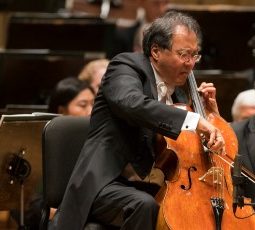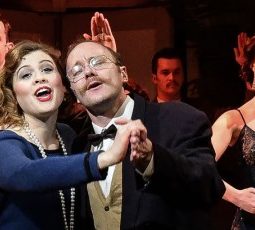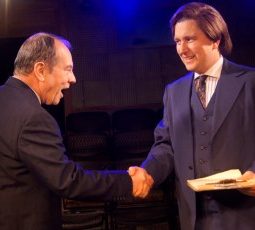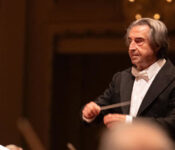Review: Officially, conductor Riccardo Muti holds the distinction of music director emeritus for life with the Chicago Symphony Orchestra. But after the 83-year-old maestro’s two-week season debut concerts at Orchestra Hall, it seems more apt to acknowledge him as the band’s artistic patriarch. When Muti’s on the podium, the CSO rises to its proper level. It glistens.
Read the full story »Muti, Chicago Symphony name Missy Mazzoli as Mead composer-in-residence for two years

This Just In:: Music director Riccardo Muti has selected American composer Missy Mazzoli as the Chicago Symphony Orchestra’s new Mead Composer-in-Residence, beginning a two-year term on July 1 and continuing through June 30, 2020. Mazzoli, 37, is already the recipient of prestigious grants and awards, including a Fulbright Grant and the Best New Opera Award for 2017 from the Music Critics Association of North America, for “Breaking the Waves.”
Is that a great white whale I see? No, mate, it’s Verne’s Nautilus, limping into Lookingglass

Review: After Lookingglass Theatre’s roundly imaginative and engaging 2015 production of Melville’s “Moby-Dick,” one might have expected Jules Verne’s “20,000 Leagues Under the Seas” to fare no less well, indeed to fall right into the Lookingglass wheelhouse. Sorry, mates. The best thing to be said for this production, adapted by David Kersnar and Steve Pickering and directed by Kersnar, is that it finally gives us a proper translation of Verne’s original French title. It’s the saga of a road trip, as nefarious as it is long, under the seas. ★★
Like a constellation viewed above the skyline, Grant Park Chorus ascends in Chicago night

Review: A Grant Park Music Festival concert celebrating singers and song featured the world premiere setting of Native American songs and stories about a star cluster called “The Pleiades,” which is visible to the naked eye in colder months. Latvian composer Ēriks Ešenvalds wrote it to be performed during the Chorus America Conference, which brought hundreds of the nation’s choruses large and small to Chicago. It played nicely in the out-of-doors in preamble to starlight and fireworks on the night before the summer solstice.
‘Damascus’ at Strawdog: A frantic white kid and a Somali-born taxi driver, both desperate

Review: In your face is probably not the right way to describe the close-up experience of watching Bennett Fisher’s taut, harrowing new play “Damascus” in Strawdog Theatre’s cozy new home. Eye to unblinking eye would be more accurate. As Somali-born Hassan drives his van down the highway from the Minneapolis airport toward Chicago, with a mysterious young white man as his passenger, news of a terrorist attack back at the airport comes over the radio. We viewers gaze straight at the two men through the van’s windshield. The increasingly anxious travelers stare right back at us. ★★★★
‘Father Comes Home From Wars’ at Goodman: Adapting Homer (et al.) to epic of moral siege

Review: Hero is strong young slave in the 1860s South who finds himself agonizing over an option: Accept his owner’s proposition to accompany him into the war against the Yankees, in exchange for his subsequent freedom, or remain behind as a slave for the rest of his life. That’s the setup of Suzan-Lori Parks’ epic and very human play “Father Comes Home From the Wars,” now on smart, provocative and impassioned display at Goodman Theatre under the direction of Niegel Smith. ★★★★
The stars align – Muti, Ma, CSO – as visitors from U.S. orchestras catch a cosmic concert

Review: You could say the 600 representatives of symphony orchestras from around the country who heard the Chicago Symphony Orchestra, with music director Riccardo Muti and cellist Yo-Yo Ma, were in the right place at the right time. If ever there was a musical nexus, this was one: the convergence of those particular performing forces and the work at hand, Shostakovich’s Cello Concerto No. 2, a sublime masterpiece captured at Orchestra Hall on June 14 in every dimension of its dark drama, searing introspection and virtuosic eloquence.
Grant Park Fest’s all-summer concert party begins with a selfie of bad-news Belshazzar

Review: Summer’s obviously just over the horizon: The musicians, chorus, maestro and devotees of the Grant Park Music Festival are already partying like the equinox has happened. As the centerpiece of the festival’s 84th summer opener, June 13-16, William Walton’s grand and colorful oratorio “Belshazzar’s Feast” felt like a reflection of the block-party atmosphere at Millennium Park.
American Players settles in for second season on new stage: This summer, it feels like home

Preview: If the novelty has worn off the new stage at American Players Theatre, which with its trap-laden floor opened last summer amid general euphoria, the charm can now begin to work its magic. Or, as APT artistic director Brenda DeVita put it: “Last year, everybody wanted to use the traps, and this year nobody’s using them. Everyone is now settling into the new place as home.” American Players’ 2018 season opens June 16 in Spring Green, Wis., with Shakespeare’s “As You Like It.”
‘Buried Child’ at Writers: Shepard’s Greek tragedy, cast in a fractured American family

Review: Sam Shepard’s darkly funny tale is not so much about the decline of an American way of life as it is about us humans losing sight of ourselves in a blur of treachery, self-denial and retribution that threatens to extend through the generations backward and forward. As directed by Kimberly Senior in a superb production, Shepard’s realm is a ramshackle pasture of the heart, where truths too painful to confess refuse to stay buried no matter how much mind-numbing alcohol, or sexual abandon or vagabondage are applied. ★★★★
CHICAGO WINE JOURNAL: 2015 Bordeaux tempt with instant appeal, but promise more

Tasting Report: Add 2015 to the impressive list of auspicious Bordeaux vintages since the turn of the millennium and the brilliant wines of 2000. Many of the region’s star producers recently converged on Chicago for a tasting under the aegis of the Union des Grands Crus de Bordeaux. The many wines I sampled suggested a vintage unusually accessible for early drinking, but also one with its share of wines built for the long haul – wines that will reward patience.
‘Suddenly, Last Summer’ at Raven: Gothic tale of Williams’ South, its poetic air blown north

Review: Like Tennessee Williams’ iconic play “The Glass Menagerie,” his later, more concise and certainly more curious “Suddenly, Last Summer” involves the perspective of memory. But the reliability – indeed, the truthfulness – of memory lies at the horrific heart of “Suddenly, Last Summer,” which now spreads its gothic wings over the stage at Raven Theatre. Despite the production’s clear narrative, the playwright’s lyricism is muted behind Southern accents. ★★★
‘L’Orontea’ at Haymarket Opera: Love’s perils keep Queen’s court at play in Baroque comedy

Review: There’s a very old charm in the number 7, and it applies with a capital C to the final production of Haymarket Opera Company’s seventh season – a thoroughly charming romp through Antonio Cesti’s “L’Orontea.” This 17th-century concoction of romance, light-hearted comedy (with one leg in farce) and good tunes is just the ticket for some pre-summer fun. ★★★★
CHICAGO WINE JOURNAL: 2016 Ports show classic profile of opulence, elegance, power

Tasting Report: Lovers of vintage Port wine learn early that, in the rarefied world of Port, “the latest thing” doesn’t come around very often. As in Champagne, the producers of Port “declare” a vintage only in exceptional years – typically about three times each decade. The recently introduced 2016 Port wines signal one of those exceptions, the first vintage declared since 2011. And what beautiful wines they are.
‘Prometheus Bound’ at City Lit: Bringer of fire
to humanity brings down the hot wrath of Zeus

Review: The Greek myth of Prometheus, who rashly gave the gift of fire to humankind and endured severe punishment for it, was the basis of Aeschylus’ fifth-century B.C. drama “Prometheus Bound,” which City Lit Theater has revived in a puppet-enhanced staging. It’s the world premiere of a new translation by Nicholas Rudall, the University of Chicago classics scholar who was the founding artistic director of Court Theatre. ★★
In a personal take on musical style, Salonen transfigures Schoenberg, Bartók and the CSO

Review: It was like two weeks with another orchestra, Esa-Pekka Salonen’s consecutive programs with the Chicago Symphony Orchestra punctuated by his leadership of the 20th anniversary concert of MusicNOW. It was a heady, exciting stretch in which the Chicago Symphony sounded like a different band. CSO music directdor Riccardo Muti’s ideal of this orchestra as the Vienna Philharmonic West was nowhere in sight from the get-go of a May 25 concert with Mitsuko Uchida as soloist in Bartók’s Piano Concerto No. 3.
Irish troupe brings Beckett’s ‘Godot’ to CST, leaving critic with nothing to wish (or wait) for

Review: Samuel Beckett was Irish by birth but a naturalized existentialist of the French line whose most famous native son remains Jean-Paul Sartre. Watching the Irish theater company Druid perform Beckett’s “Waiting for Godot” – at once vivid and bleak, its characters dithering and hobbled and resigned to their absurd circularity – I couldn’t help thinking of Sartre’s “No Exit.” ★★★★★
‘The Originalist’ at Court: High court’s Scalia, lion who loves a fight, spars with spunky clerk

Review: Everything about John Strand’s play “The Originalist,” a philosophical profile of the conservative Supreme Court Justice Antonin Scalia now on the boards at Court Theatre, recommends the enterprise as a one-man show. The positive side of that is Edward Gero’s expansive, assured and piquant performance as Scalia. On the shadowed side of “everything” I mean, well, everything else about this contrived and tormented attempt to turn what is essentially fascinating and funny stand-up into high drama. ★★
‘How to Use a Knife’ at Shattered Globe: Slicing to heart of the human, or is it a beast?

Review: In a different setting, Steve, an anonymous immigrant from Rwanda working as a dishwasher in an ordinary New York eatery, knows well enough how to use a knife. But when a master chef, or what’s left of him after the ravages of alcoholism, takes charge of the kitchen, the quiet dishwasher is drawn out by the elegant appeal of culinary art. That’s the setup of Will Snider’s wry and unsettling play “How to Use a Knife,” offered in a savory preparation by Shattered Globe Theatre and director Sandy Shinner. ★★★★★
‘Grand Hotel’ at Kokandy Productions: Lobby teeming with life, fraught with secret regrets

Review: I’ve always loved “Grand Hotel,” since I first saw the 1932 film with its incredible all-star cast that only begins with Greta Garbo, John Barrymore and Joan Crawford. In 1989, the film, based on a novel by Vicki Baum and a play by William A. Blake, was transmuted quite successfully into the musical that Kokandy Productions now offers in a concept and cast that get right at the poignant heart of the story. ★★★★
CHICAGO WINE JOURNAL: WillaKenzie nets the elusive essence of Burgundy’s Pinot Noir

Tasting Report: It is a pervasive proposition of Oregon winemakers, whose red grape of choice is generally Pinot Noir, that their wines are created on the Burgundian model. One producer whose Pinot Noir might actually be taken for Burgundy, in both style and structure, is WillaKenzie Estate.
Salonen leads Chicago Symphony on Mahler’s Ninth Symphony voyage of life, transcendence

Review: Somewhere along the mountainous range of peak moments in the Chicago Symphony Orchestra’s recent seasons stands the performance of Mahler’s Ninth Symphony led by Esa-Pekka Salonen on May 17 at Orchestra Hall. It was memorable in a degree commensurate with the monumentality of the work itself, and the Ninth Symphony vies only with the song-symphony “Das Lied von der Erde” as Mahler’s absolute masterwork.
‘Frost/Nixon’ at Redtwist: Brian Parry catches the posture and pitch of a sinner in confession

Review: On Aug. 9, 1974, Richard M. Nixon became the first president of the United States to resign from office, rather than face almost certain impeachment and removal after the Watergate scandal. But doggedly insisting that “I’m not a crook,” he never admitted to wrong-doing – until three years later, in a most improbable interview with British talk show host David Frost. That’s the setup of Peter Morgan’s 2006 play “Frost/Nixon,” which Redtwist Theatre has brought to its compact space with Brian Parry as Nixon, up close and amazing. ★★★★★
‘Buddy Holly’ at American Blues: Just a kid and his Stratocaster on a short, meteoric ride

Review: This happy news just in: “Buddy: The Buddy Holly Story,” the supercharged jukebox bio musical that American Blues Theater had planned to unplug May 26, will rave on – after a break – through Sept. 15. This irresistible portrait of Holly’s brief but meteoric life and ground-breaking music should delight anyone with a pulse – and raise it several notches. In the intimate Stage 773, you can just about reach out and touch Zachary Stevenson’s true-to-life personification of the determined kid from Lubbock, Tex., who rocketed to rock immortality. ★★★★★
Spaces at the Art Institute frame MusicNOW as contemporary venture observes 20th year

Review: The MusicNOW endeavor of the Chicago Symphony Orchestra is in the middle of a roaring spring expansion under the cultivating flair of composers-in-residence Samuel Adams and Elizabeth Ogonek. The latest MusicNOW shoot was an experiment within three different spaces at the rambling Art Institute of Chicago, including Chagall’s America Windows room. And that was preamble to the MusicNOW grand finale, featuring two world premieres, on May 21 at Orchestra Hall.
Schumann’s shadowed Violin Concerto finally gets CSO debut, and Saint-Saëns raises roof

Review: The history of Schumann’s Violin Concerto in D minor is effectively brief and considerably checkered. It was composed in 1853, then put away – by devoted friends of Schumann who considered their action to be judicious – and not resuscitated for another eight decades. The work’s few advocates today include violinist Isabelle Faust, who was the soloist for the Chicago Symphony Orchestra’s very first performance of the concerto on May 11.
‘Macbeth’ at Chicago Shakespeare: Like a hell-broth, boil and bubble – and mix this magic in

Review: If ever there was a play meant for the sleight of Teller’s magicianly hand, it is Shakespeare’s “Macbeth.” The Scottish tragedy is all about what appears to be there, but is not. Ambiguity, misdirection, illusion: This is the stuff of “Macbeth,” and it forms the clever heart of the play’s current incarnation at Chicago Shakespeare Theater. I should hasten to add that Teller is only co-director; his fellow conspirator is Aaron Posner, whose invisible hand operates more on the dramatic side of events and indeed quickens both the show’s pace and the viewer’s pulse. ★★★★
Hershey Felder, face of many musical giants, takes on the genius and pain of Tchaikovsky

Review: Give pianist-actor Hershey Felder credit. He has managed to crawl inside the skin of characters as diverse as Bernstein and Beethoven and Irving Berlin, and to give them plausible life. His latest solo turn, as Pyotr Ilyich Tchaikovsky, is about to wind up a brief run in the upstairs space at Steppenwolf Theatre. While musically authoritataive, as an exploration of Tchaikovsky, man and artist, Felder’s breathing sculpture left the impression of a work not yet finished. ★★★
‘Memphis’ at Porchlight: White guy, mad about black music and a girl, sends apple cart flying

Review: By now I have seen the gritty and electrifying musical “Memphis” – about the pre-dawn of rock ‘n’ roll, the modulation of black music into the white mainstream in the early 1950s – in three different stagings: the original Broadway production, the national tour and the current version mounted by Porchlight Music Theatre in its new home at the Ruth Page Center for the Arts. This one feels, breathes, rips like the “Memphis” I’ve been waiting for. ★★★★★
‘Until the Flood’ at Goodman: A black youth falls to an officer’s gun; a community reflects

Review: Dael Orlandersmith’s one-woman play “Until the Flood,” now in a brief run at the Goodman Theatre, is about race and racism, but also about individual potential and personal accountability. It is an eloquent and evenhanded response to the fatal shooting of the African-American teenager Michael Brown by a white police officer in the St. Louis suburb of Ferguson the night of Aug. 9, 2014. ★★★★
With winning twin bill of Donizetti unknowns, Chicago Opera Theater reaffirms place in sun

Review: Many opera enthusiasts, many friends of Chicago Opera Theater, must have emerged from the company’s recent double bill of Donizetti one-acters, early and late, at the Studebaker Theatre thinking what I was thinking: Who knew? Gaetano Donizetti (1797-1848), a prodigious composer of bel canto operas, is remembered today essentially for a handful of works: “Lucia di Lammermoor,” “La favorita,” “The Daughter of the Regiment,” and “Don Pasquale.”But who ever heard of his late one-act comedy “Rita,” written two years before “Don Pasquale,” or his student melodrama “Il Pigmalione,” the work of an obviously gifted lad of 19?
Recent Posts
- In concerts brilliant and grand, Muti showed
why he still waves magic wand over the CSO - CSO finale’s convergence of three young stars signaled new energy heading into Mäkelä era
- Mäkelä, CSO’s maestro-elect, shows his chops with baton and bow in Oslo orchestra concerts
- Haymarket Opera closes out its spring season with early Handel oratorio ‘La Resurrezione’
- In concerto ‘The Elements,’ CSO and violinist mined the potential of composer partnerships
Most Commented
- Role Playing: Janet Ulrich Brooks on nailing the style of a wily Russian in 'A Walk in the Woods'
- Role Playing: City boy Michael Stegall ropes wild cowboy in Raven Theatre’s ‘Bus Stop’
- Role Playing: Sadieh Rifai zips among seven characters in one-woman ‘Amish Project’
- Role Playing: Kirsten Fitzgerald inhabits sorrow, surfs the laughs in ‘Clybourne Park’
- Role Playing: Brent Barrett’s glad he joined ‘Follies’ as that womanizing, empty cad Ben


